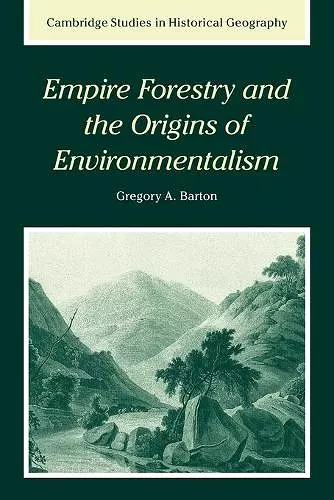Empire Forestry and the Origins of Environmentalism
Tracing the historical roots of a global movement
Format:Paperback
Publisher:Cambridge University Press
Published:6th Aug '07
Currently unavailable, and unfortunately no date known when it will be back
This paperback is available in another edition too:
- Hardback£62.00(9780521814171)

This book explores the historical roots of environmentalism, focusing on the empire forestry movement's global influence and its lasting impact on conservation efforts.
The movement we recognize today as environmentalism traces its roots back to the establishment of the first empire forest in 1855 in British India. This pivotal moment marked the beginning of a widespread forestry movement that would resonate across the globe. Gregory Barton's insightful study delves into the historical context of this development, exploring how the empire forestry movement rapidly expanded beyond India to regions such as Africa, Australia, New Zealand, Canada, and eventually the United States. Through this lens, readers gain a comprehensive understanding of the foundational elements that shaped modern environmentalism.
During the latter half of the 19th century, over ten percent of the Earth's land surface transitioned to protected status as a public trust. These expansive forest reservations, often larger than contemporary nations, were not solely about preservation; they also served as revenue-generating resources. The movement garnered support from notable figures like Rudyard Kipling and Theodore Roosevelt, who celebrated the emergence of a new class of government foresters as champions of public welfare. This recognition underscored the importance of sustainable management of natural resources and the interconnectedness of the environment.
However, the warnings issued by imperial foresters about potential catastrophes, such as desertification and climate change, highlight the urgency of their mission. As Barton articulates in Empire Forestry and the Origins of Environmentalism, the legacy of these early environmental efforts continues to influence contemporary discussions about conservation and sustainability, illustrating the enduring significance of this historical movement.
'The central thesis of this challenging book is that imperialism and environmentalism have a shared past that many scholars, especially those on the political left, wish to deny … I have much sympathy with this brave … deconstruction of the sources of practical environmentalism.' Philip Stott, History Today
'This book is well researched, easy to read, extremely good value and, for landscape historians interested in the interaction of human agency and environmental history it provides a succession of interesting case studies grounded in the landscape of the New Orleans river front.' Landscape History
ISBN: 9780521038898
Dimensions: 229mm x 153mm x 11mm
Weight: 328g
212 pages